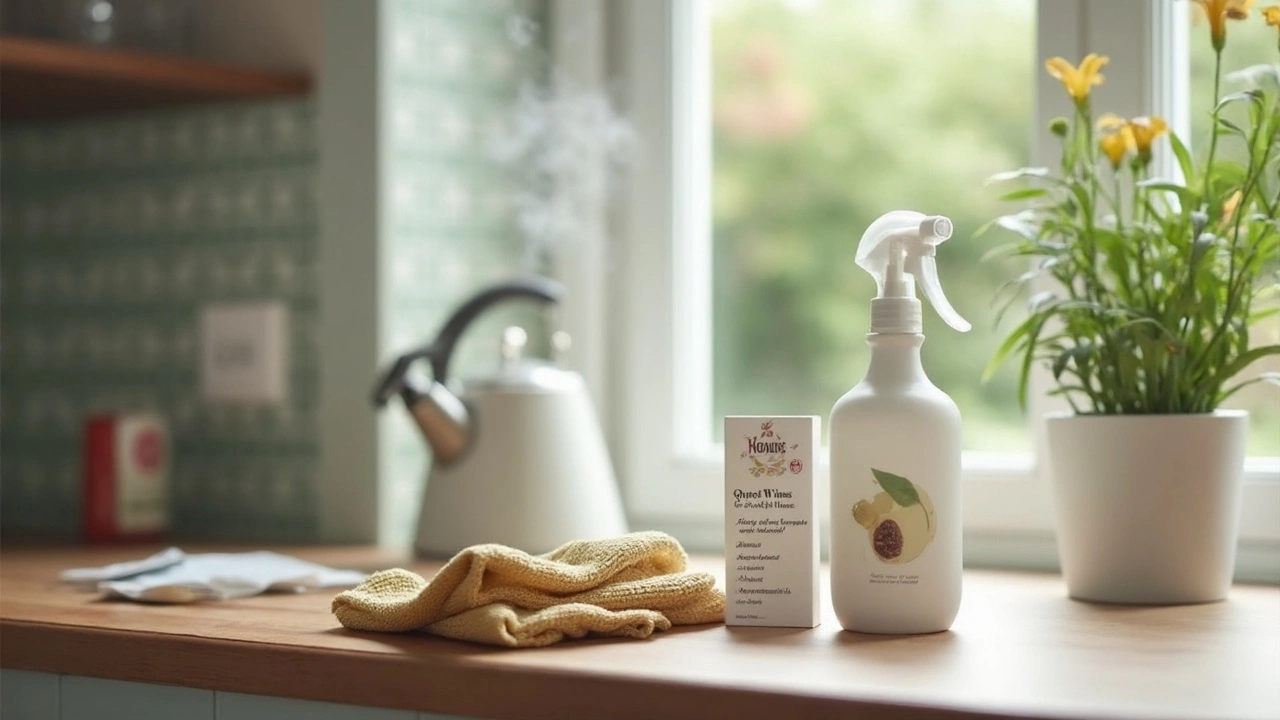There’s this idea floating around that everyone’s home is clean all the time. Maybe your social feeds are full of spotless kitchens and folded towels. But in real life? Most people don’t scrub, mop, or dust every day or even every week. According to recent surveys, the average person deep cleans just once a month, but does basic tidying—like dishes or taking out trash—almost daily. The rest? A lot gets pushed to whenever people find time (or have guests coming over).
You don’t need a rigid schedule, but knowing how often others clean can help you set your own rhythm. This isn’t about feeling guilty for dust bunnies under the bed. It’s about keeping things healthy, comfortable, and easy to manage, without making cleaning your whole life.
- Real Numbers: How Often People Actually Clean
- Why Some Chores Matter More Than Others
- Breaking It Down: What Needs Cleaning and When
- Survivor Tips for Lazy or Busy Folks
- Spring Cleaning: Still Worth the Hype?
Real Numbers: How Often People Actually Clean
Let’s get real about what people actually do—not what they post online. Big surveys, like one from the American Cleaning Institute in 2024, show that only about 48% of people do a serious whole-house cleaning every month. Most daily cleaning is pretty limited: think dishes, wiping kitchen counters, and picking up clutter. The rest—like mopping, dusting, or scrubbing bathrooms—slides into a less predictable routine.
Here’s what the stats look like for the average person in the US:
| Task | How Often |
|---|---|
| Dishes | Daily |
| Wipe kitchen counters | Daily |
| Take out trash | 2-3 times a week |
| Vacuum or sweep floors | Weekly |
| Scrub bathroom | Biweekly |
| Change bed sheets | Every 2 weeks |
| Dust furniture | Every 2-4 weeks |
| Deep clean whole house | Once a month |
Life gets busy, so people tend to prioritize the spots that get gross quickly. Kitchens and bathrooms see the most action, while baseboards and ceiling fans pretty much get ignored until spring cleaning fever strikes. Pet owners and parents are way more likely to do certain chores more often out of necessity. Bottom line: very few people stick to a strict schedule. A lot just clean when dirt or clutter starts to bug them, or when guests are coming over.
The big takeaway? For most, keeping up with spring cleaning is less about sticking to a calendar and more about dealing with the mess as it happens. If you’re not hitting those numbers exactly, you’re not alone.
Why Some Chores Matter More Than Others
Not all household chores pack the same punch. Some jobs make a huge difference in your daily comfort and health, while others are really more about showing off or chasing that Pinterest look. It boils down to what actually keeps your place safe, clean, and livable. For example, regularly cleaning your kitchen—especially counters, sinks, and cutting boards—keeps germs in check. The CDC points out that wiping surfaces where you prep food helps avoid common illnesses like salmonella or E. coli.
Dust can build up quickly and isn’t just an eyesore. It messes with air quality and kicks up allergies, which is why quick dusting and vacuuming matter if you’ve got pets, allergies, or asthma. Same goes for the bathroom. Wiping down the toilet, sink, and shower doesn't just look better—it helps kill bacteria and keeps grime from turning into permanent stains. If you skip these, you’ll probably notice smells and stains much faster than if you forget to mop the entryway.
- Spring cleaning is about getting the tough jobs out of the way—stuff like deep cleaning your oven, washing windows, or tackling baseboards and ceiling fans. These big chores don’t have to happen every week, but doing them seasonally really cuts down on buildup you don’t notice day-to-day.
- Some tasks, like making your bed or picking up dirty laundry, don’t have health risks but they just make life feel neater and less chaotic.
- Dishes, trash, and kitchen wipes are the "must-dos" for most people. Let them slide for a few days and you’ll see (and smell) why.
If you need to prioritize, focus on what can pile up fast and mess with your health—kitchens, bathrooms, and anything related to food or water. The rest? Fit it in as you go or when you get a burst of energy.

Breaking It Down: What Needs Cleaning and When
If you’ve ever wondered what actually needs cleaning and how often, you’re definitely not alone. Here’s the thing: some stuff you’ll want to hit daily, some weekly, and a few only a couple times a year. If you’re just winging it, a simple plan can save time and keep your house from getting gross.
Let’s get concrete. According to the American Cleaning Institute’s 2024 findings, here’s how often people are cleaning the main things around their homes:
| Task | Recommended Frequency | Average Person's Actual Frequency |
|---|---|---|
| Dishes | Daily | Daily |
| Vacuuming/Sweeping Floors | 1-2 times/week | Once/week |
| Changing Bed Sheets | Every 1-2 weeks | Every 2-3 weeks |
| Bathroom Clean (toilet, sink, shower) | Once/week | Every 10 days |
| Dusting | 1-2 times/month | Once/month |
| Fridge Clean-Out | Monthly | Every 2 months |
| Windows | 2-4 times/year | Twice/year |
Not everything’s got to be spotless round the clock. Here’s a quick breakdown so you don’t have to second-guess:
- House cleaning frequency is not about impressing anyone—it’s about keeping dust, germs, and clutter in check.
- Dishes and countertops get gross fast, so hit those daily if you want to avoid smells and bugs.
- Bathrooms creep up on you. A wipe-down once a week keeps most grime under control. If you live with lots of people, you might need to step that up.
- Bedsheets are more flexible, but every two weeks is a sweet spot for most folks (and helps with allergies).
- Floors depend on pets and foot traffic. Once a week works for many, but pet hair or little kids? Twice a week might save your sanity.
- Deep stuff—think ovens, vent hoods, fridge interiors—can wait for those quarterly or spring cleaning sessions. Set yourself a reminder and you’re golden.
Try tying chores to something you already do, like cleaning the bathroom after your Monday shower or vacuuming before your usual movie night. Small habits add up, and before you know it, things look and feel better without a big time investment.
Survivor Tips for Lazy or Busy Folks
If your days are jam-packed or cleaning just feels like a never-ending drag, you’re not alone. Half of adults say they only do big cleaning jobs when they absolutely have to—like before a party or when the mess starts to bug them. But there are ways to keep your place liveable and even tidy, without dedicating entire weekends to scrubbing floors.
Here’s a no-nonsense approach:
- Pick your battles. Focus on high-traffic areas: kitchens, bathrooms, and where you spend the most time. Living rooms and entryways for most people. These spots matter most for health and sanity.
- Micro-cleaning works. Do a little whenever you notice dirt, instead of saving everything for later. Wipe the bathroom counter after you brush your teeth. Sweep the kitchen floor while your coffee brews.
- Set a timer. Ten minutes a day beats a four-hour Saturday marathon. You’ll be surprised how much you can tackle if you just aim to clear surfaces or dump clutter for a few focused minutes.
- Use the right tools. Keep cleaning wipes, a handheld vacuum, or a multi-surface spray within easy reach. You’re more likely to wipe down that grimy spot if you’re not digging through a closet for supplies.
- Combine chores with other habits. Wipe down the sink while waiting for the shower to warm up. Run the dishwasher before bed so you wake up to a fresh kitchen.
Check out the numbers—this table shows which house cleaning frequency tricks actually stick with folks who hate cleaning or have zero extra time:
| Quick Task | % Who Do It Daily | % Who Only Do Weekly |
|---|---|---|
| Wipe kitchen counters | 68% | 17% |
| Take out trash | 61% | 23% |
| Sweep/vacuum entryway | 42% | 33% |
| Wipe bathroom surfaces | 28% | 38% |
The trick is finding what’s manageable and sticking with it. You don’t have to be spotless; you just need habits that keep chaos in check. Got ten minutes? That’s enough to change how your space feels—and cut the stress next time friends drop by unannounced.

Spring Cleaning: Still Worth the Hype?
Every spring, there’s this buzz about deep cleaning. Is it a leftover tradition or does it actually make a difference? Turns out, there’s good reason for giving your space a total reset once a year. A 2024 study by the National Cleaning Institute found that homes getting a once-a-year deep clean had 30% fewer allergy triggers and way less dust build-up compared to the homes where people just did the basics all year.
The idea of spring cleaning actually started back when houses were lit with oil lamps, which left a sticky layer everywhere by winter’s end. Even though we don’t have oil lamps now, clutter and grime still slide in once we ignore them. And let’s be honest, some stuff only gets noticed (or gross) after a few months, not days.
“Spring cleaning isn’t just about dirt—it’s about giving yourself a chance to reset your space and head into a new season without the stuff weighing you down,” says cleaning expert Melissa Maker.
This yearly ritual does a few things regular, day-to-day chores can’t:
- Clears out hidden allergens—old pet hair, pollen, and dust mites love corners behind couches.
- Gives you a chance to declutter—say goodbye to stuff you haven’t used since last year.
- Helps spot maintenance issues—leaky pipes, mold, or damage that everyday cleaning misses.
- Makes your home feel fresher for months—studies show regular deep cleans improve mood and sleep quality.
So how intense is this tradition? Check out these recent numbers on how people tackle spring cleaning in the US:
| Task | % of Households Doing Yearly |
|---|---|
| Wash windows & screens | 76% |
| Deep clean kitchen appliances | 61% |
| Organize closets/wardrobes | 68% |
| Shampoo carpets/rugs | 47% |
| Wash curtains/blinds | 34% |
If you only do one big clean a year, focus on the spots nobody touches the rest of the time: baseboards, under beds, the tops of kitchen cabinets, and window tracks. Box up what you haven’t used in the past 12 months and donate or dump it. You’ll be surprised by how much lighter your place—and your brain—feels after.
